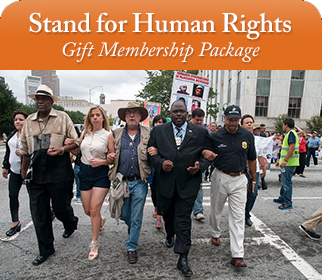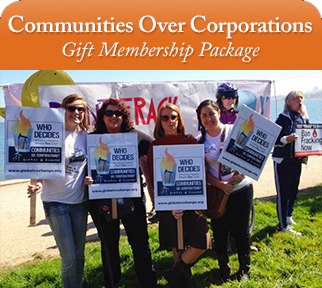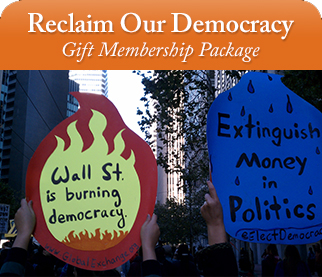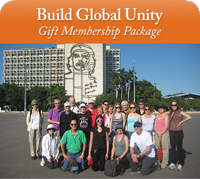 Guess what today is…it’s Global Exchange’s 25th Birthday!
Guess what today is…it’s Global Exchange’s 25th Birthday!
To celebrate, Global Exchange Human Rights Program Director Ted Lewis takes a look back over the past 25 years at Global Exchange’s never ending struggle for peace and human rights in his article which originally appeared in Global Exchange’s 25th Anniversary Newsletter. (Become a Global Exchange member and you can receive our newsletter delivered right to your mailbox.)
—

Ted Lewis
25 Years in the Never Ending Struggle for Peace and Human Rights by Ted Lewis
Throughout human history, great movements for peace, human dignity, and self-determination have never been tidy or predictable. They have never succeeded without vision, patience nor sacrifice. Nor have their costly gains been destined to endure in the absence of ongoing struggle. The vision of those who founded Global Exchange in 1988 was to plunge directly into the ancient, immediate, and always turbulent currents of this perpetual quest for human liberty; bringing their talents, energies, communities, and good hearts to the work of building, renewing, and sustaining it.
They knew their work and their tactics would be controversial. Artists of social change have always stirred deep passions amongst both those who cast their lot with them and those who bitterly opposed them. Consider the lives and spirits of a few figures who have shaped our world and wrought dramatic changes over the ages: Jesus Christ, King Ashoka, Joan of Arc, Mother Jones, Emiliano Zapata, Mahatma Ghandi, Dorothy Day, Anne Frank, Rosa Parks, Nelson Mandela, Martin Luther King, Che Guevara, Oscar Romero, Harvey Milk, Wangari Maathai, Samuel Ruiz, Rachel Corrie and so many others.
These leaders fought vastly different battles, were inspired by distinct visions, and have left unique footprints in their wake, but all had this in common: They were bold, took risks, spoke their minds, and adopted tactics that scandalized many of their contemporaries. They also succeeded in changing countless minds and the course of history.
No one at Global Exchange would presume to compare ourselves with these great leaders. We do unabashedly acknowledge learning from them and studying the ways they have shed light on injustice, illuminated a path to change, and inspired millions of people to participate and persist, both in success and failure. Aware of the contradictions, responsibilities, and great opportunities that confront the citizens of a world-spanning empire we have struggled for the last 25 years to free our own minds while devising an array of tactics to challenge the arrogance and excesses of power.
In practical terms this has meant mounting dozens of public education campaigns. To build an informed constituency for change we have organized more than a thousand educational tours to countries where U.S. policies have had strong – usually negative – impacts. We opened stores on both coasts to promote Fair Trade and expand markets for cooperatives and other producers around the world.
We have convened hundreds of targeted demonstrations, exposing abusive practices by governments and corporations – using shaming, consumer boycotts, and non-violent direct action to pressure for reforms. We have also provided direct support to movements for revolutionary change around the globe, often giving visibility to their leaders by organizing speaking tours for them in churches, community centers, universities, libraries, and public plazas across the United States. We have organized international elections observation at key transitional moments in more than 15 countries. Throughout we have engaged media –print, radio, television, and, of course, the Internet, as it blossomed into a powerful communications and organizing tool over the last two decades.
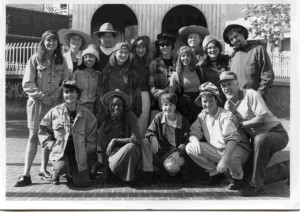
Global Exchange Staff–Then!
The Early Years
In 1988, the year Global Exchange was founded, freedom struggles in Central America, Haiti, and Southern Africa confronted systematic repression by regimes long supported by the United States. But that was changing. Fierce opposition on the ground and strong solidarity movements in the United States were making a difference. Years of organizing and a massive civil disobedience campaign had forced the Reagan Administration to join an economic boycott of South Africa it had long resisted. Similarly, deep opposition and Congressional votes against the Administration’s ugly proxy war on Nicaragua resulted in illegal funding of the war whose revelation in the “Iran Contra” scandal almost brought down the erstwhile “Teflon” Reagan.
Global Exchange joined the fray by organizing delegations in solidarity with Honduran opposition groups. Honduras, where death squads had obliterated a small revolutionary movement, was host to a large U.S. military presence and served as a base for the Contras who were attacking Nicaragua. Global Exchange recognized that that era’s solidarity movements had largely overlooked Honduras. Medea Benjamin’s widely read, Don’t Be Afraid Gringo chronicled the struggles of an extraordinary Honduran peasant women and helped move the debate as peace negotiations and disarmament began to replace war in the region. Meanwhile delegations to southern Africa helped build public awareness in the U.S. where deepening opposition to Apartheid accelerated its demise.
In 1989 when the Berlin Wall fell and the rotten and oppressive regimes of the Soviet bloc collapsed in the face of massive popular discontent, great hopes were awakened in the United States. Perhaps now, many thought, with the Cold War behind us we can finally put an end to the militarism that has diverted our precious resources and twisted our national priorities. Perhaps now we can invest in our people and the solutions to looming environmental disasters.
But that dream was not fulfilled. Instead, then President George H.W. Bush found new pretexts for war –against Saddam Hussein, against Manuel Noriega, and against “drugs” to keep the illusions of “security through strength” alive. Under the guise of the “New World Order” he sought to consolidate U.S. power and lay the groundwork for what we have come to know as “economic globalization” –or in other words opening the path to corporate domination of the world economy under rules that undermine labor, the environment, popular movements, and national sovereignty — all in the name of growth and efficiency.
Global Exchange naturally joined the opposition to the wars spawned by the first President Bush. Kevin Danaher began writing and speaking about the threat posed by unrestrained corporate control of the rules governing the world economy. Kevin’s persistent campaign – in public meetings, in articles and in books he authored; and, perhaps most importantly, on radio shows large and small in communities all across the United States, earned him the moniker: “The Paul Revere of Globalization’s woes.”
Recognizing the danger it posed for both Mexico and the United States, Global Exchange joined the labor movement and other progressive forces in the United States in adamantly, though unsuccessfully, opposing ratification of the North American Free Trade Agreement (NAFTA).
On January 1, 1994, the first day of the treaty’s implementation, indigenous peoples in the southeastern Mexican state of Chiapas rose up in arms. They invoked the spirit of the legendary Mexican revolutionary, Emiliano Zapata who had famously proclaimed that, “The land belongs to those who till it.”
The poorly equipped Zapatista forces were immediately and ferociously attacked by the Mexican Army under the command of Carlos Salinas de Gortari, the fraudulently elected, Harvard educated president of Mexico who was one of principal architects of NAFTA. As a pre- condition for NAFTA, Salinas had worked closely with U.S. Ambassador John Negroponte to eliminate collective land rights that had, until 1993, been enshrined in Mexico’s constitution.
Sympathy with the rebels ran high and after just 12 days Salinas was forced to call off his offensive when more than a hundred thousand Mexicans flooded Mexico’s City’s Zocalo in support of the rebellion. As peace negotiations got underway a call for international solidarity was issued and Global Exchange responded immediately, sending delegations and direct support to army occupied communities that formed the civilian base of the Zapatista movement.
For the next ten years, Global Exchange maintained a continuous presence in Mexico’s southeast. Our team recruited, trained, and housed taken a leading role in pushing big hundreds of volunteers who worked in cooperation with local human rights organizations and the Dioceses of San Cristobal to permanently maintain observers in more than 40 remote, army occupied villages.
These tenacious observers faced army harassment, threats from paramilitary organizations, and even illegal deportation. Nevertheless, they persisted, producing a series of reports, hosting dozens of international delegations, and coordinating sophisticated, high profile international elections observations in both Chiapas and nationally over a 12 year period highlighted by the demise of one- party rule.
During this time there were horrific events such as the 1997 paramilitary attack on the hamlet of Acteal that killed 45 children, women, and men. Nevertheless, the larger civilian observation effort Global Exchange formed a part of what was indisputably a vital factor in limiting and deterring the kind of unrestrained genocide that occurred during the prior decade in neighboring Guatemala – where more than 80,000 were slaughtered and 400 indigenous villages entirely obliterated.
Economic Activism
During the 1990s Global Exchange became a leading voice in the Fair Trade movement. This reflected our growing understanding that the new global economy thrives on geographically separating those who produce things from those who buy them, even as it sets up a race to the bottom for workers around the world. Opposing such pernicious trends is difficult and requires new tactics, one of which is educating people and harnessing their collective consumer power to force corporations to improve working conditions, pay workers fairly, and respect the environment.
That is why Global Exchange has opened Fair Trade stores and taken a leading role in pushing big companies like NIKE and GAP to adopt workplace health standards that set a bar industry wide. Other big corporations like Starbucks, Proctor & Gamble and Hershey have responded to pressure as well. Despite these successes, we also recognized that as long as the rules of the international economy favor corporate power over control by the people the wealthy will have a club to beat the rest of us into submission.
In November 1999, we helped organize a broad coalition of trade unionists, environmentalists, students, Zapatista inspired activists, and many others to surround and shut down the first North American meeting of the World Trade Organization (WTO) in Seattle. This action had worldwide resonance and inspired several other massive direct actions aimed to tangle the agenda of the undemocratic global rule makers at subsequent meetings in Washington, Quebec, Italy and elsewhere around the world.
The movement behind these actions was a genuinely global and effective popular challenge to lords of capital and was just reaching maturity when the shocking, criminal, and cowardly attacks on the World Trade Center took place on September 11, 2001. The sickening loss of life and the lust for vengeance it inspired in the United Sates served to wipe all other issues off the table.
Resistance to War and Occupation
The leadership of Global Exchange quickly huddled and decided to buck the tide of war. Just a week after the attacks of September 11 we organized a large commemorative action calling for reflection, forbearance, and peace in San Francisco. We recognized – sooner than many – that this attack was just what the fraudulently elected American president, George W. Bush needed to consolidate his power and give free rein to the neo-conservatives, warmongers, and torture advocates lurking in his administration.
We didn’t want to be right about Bush’s intentions, but we were. As everyone remembers, Bush was not satisfied with attacking Al Qaeda’s base in Afghanistan. He repressed dissent, violated civil liberties, filled the airwaves with lies and propaganda while manufacturing false evidence of an Iraqi threat. Rather than deal with the core issues of the Middle East conflict – like the ongoing Israeli occupation of Palestinian lands – George W. Bush rushed the country headlong toward a divisive war. In the face of this onslaught, we helped build what became a massive, worldwide movement to oppose the looming war. Millions took to the streets around the globe in coordinated actions to keep the peace and uphold international law, but it was not enough.
In March 2003 the invasion and all its grim consequences ensued. In the early days of the U.S. occupation, Global Exchange worked with the newly emerging CODEPINK: Women for Peace to build ties to Iraqi civil society and monitor the occupation on the ground. But, as Iraqi resistance to the occupation mounted the situation became too dangerous and chaotic to continue the effort. Close partners suffered kidnappings and the “Occupation Watch” felt compelled to withdraw, even as tragedy mounted, and more than one hundred thousand of Iraqis died, and the country fractured. Not long after, the tragedy became very personal for those of us at Global Exchange. Our dear friend, Marla Ruzicka, a brave young activist dedicated to helping civilian victims of the war had her beautiful life’s work cut short in a car bomb attack near Baghdad.
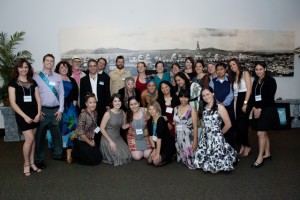
Global Exchange staff-Now!
The Road Forward
For several years, fighting back against the Bush Administration’s assault on peace and freedom absorbed most of our attention, but we never lost sight of the need to keep struggling for a peaceful, fair, healthy, and democratic planet. Even as our anti-war organizing continued, we invited elections experts from 15 countries to observe our 2004 electoral process with an international optic. When draconian anti-immigrant legislation threatened to become law in 2006 we join millions of immigrants – documented and undocumented – who took to the streets all across the United States. We worked with groups in Mexico and the United States to make the case that NAFTA had undermined the basic “Right to Stay Home” of Mexico’s people and that measures must be taken to restore it.
As the threat of catastrophic climate change has grown even more imminent we have joined forces with others around the globe who are asserting the natural rights of people and ecosystems, not giant energy companies or their allies in and out of government to control the decisions that will determine our collectives fates.
The next twenty-five years of life on planet earth will not be easy or simple ones, but Global Exchange will continue to be there, fighting together with those who hold life precious and are determined to build a better future. We have never done it alone, and we never will. We are all in this together.
 TAKE ACTION!
TAKE ACTION!
This article originally appeared in Global Exchange’s 25th Anniversary newsletter issue which was mailed out to Global Exchange members. If you would like to receive our newsletter along with other benefits, please consider supporting Global Exchange’s continuing social justice efforts —Become a Global Exchange member.
Share Your Story: What was your favorite Global Exchange action? Where have you traveled with us? What campaign, victory, event, protest moved you? What inspired you to join us and take action? Share your stories, thoughts, and memories with us.


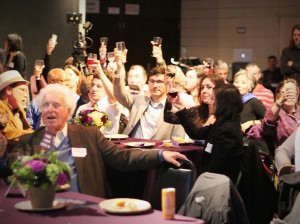

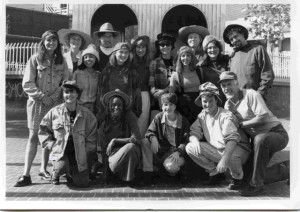
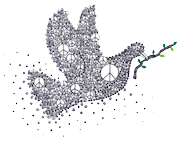


 Guess what today is…it’s Global Exchange’s 25th Birthday!
Guess what today is…it’s Global Exchange’s 25th Birthday!



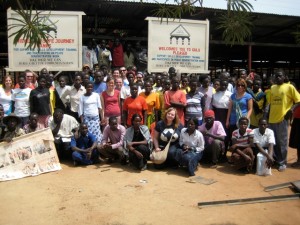



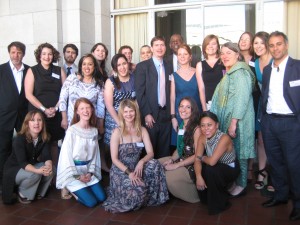
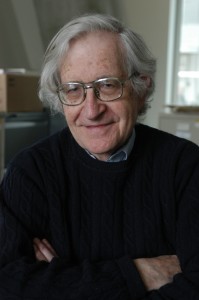

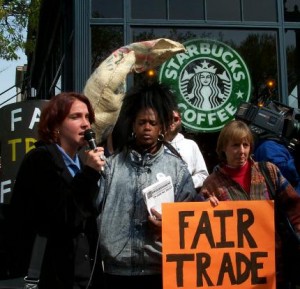
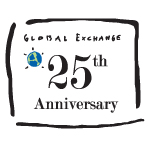 As we set our sights on the next 25 years, with your support we will reform U.S. gun laws, force Hershey’s to go Fair Trade, and continue to oppose unjust policies in the U.S. and abroad.
As we set our sights on the next 25 years, with your support we will reform U.S. gun laws, force Hershey’s to go Fair Trade, and continue to oppose unjust policies in the U.S. and abroad.


